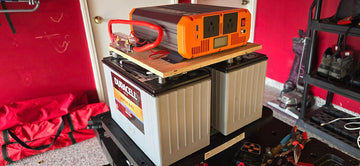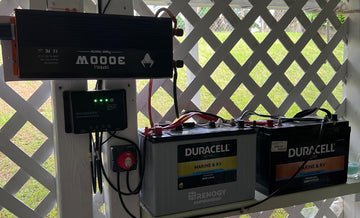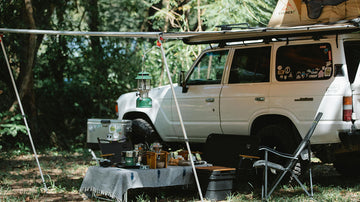Deep-cycle marine batteries play an essential role as a key power source in marine exploration, yachting or fishing operations. They not only provide start-up energy for the vessel, but also support the operation of navigation, communication and lifestyle systems. Therefore, knowing how to properly charge deep cycle marine batteries is essential to ensure the smooth running of activities at sea.
Understanding Deep Cycle Batteries
Deep cycle batteries are a type of battery designed to provide long-lasting, efficient power. They are capable of releasing a relatively constant charge over an extended period of time, making them suitable for use in applications that require power for extended periods of time, such as boats, caravans and other mobile devices.
The primary role of deep cycle batteries is to provide electrical power to support a variety of electrical devices such as lighting, navigation systems and electronic equipment. With these devices in continuous operation, deep cycle batteries are able to withstand multiple full discharges without compromising battery life.
Types and Characteristics of Deep Cycle Batteries
There are two basic types of deep-cycle marine batteries: lead-acid batteries and lithium batteries.
- Lead-acid batteries: These batteries are more traditional and offer relatively low cost and high durability. Lead-acid batteries are usually available in both dry (AGM) and liquid forms; AGM batteries are sealed and leak-proof, making them suitable for the marine environment.
- Lithium batteries: Lithium batteries have a higher energy density and longer service life than lead-acid batteries. Although more costly, more and more vessels are adopting lithium batteries as their power source due to their light weight and fast charging speed.
lithium or AGM batteries
When choosing a marine deep cycle battery, lithium and AGM (Absorbed Glass Mat) batteries each have their own advantages and disadvantages for different usage scenarios. Below is a detailed comparison of these two types of batteries to help you make your decision:
1. lithium battery
Pros:
- High energy density: lithium batteries can store more energy in a smaller size and weight, making them suitable for ships that deliver more power.
- High number of charge/discharge cycles: Long life span, typically 2,000 to 5,000 charge/discharge cycles.
- Fast charging capability: faster charging, can usually be fully charged in a short period of time.
- Low self-discharge rate: better retention of power when not in use for long periods of time.
- High efficiency: high charging efficiency and low energy loss.
Disadvantages:
- High initial cost: lithium batteries are relatively expensive to buy, but these costs can be offset by a longer lifespan.
- Specialised charging equipment required: specific chargers integrated with the BMS (Battery Management System) are required.
- Temperature sensitive: performance may be affected at extreme temperatures (especially too high or too low).
2. AGM batteries
Advantages:
- Relatively low cost: AGM batteries have a low initial purchase cost, making them suitable for users with limited budgets.
- Good durability: AGM batteries are more durable and suitable for harsher environments.
- Maintenance-free: Sealed design eliminates the need for regular water refilling, making maintenance simple.
- Strong charging compatibility: compatible with a wide range of chargers, charging is relatively easy.
Disadvantages:
- Short cycle life: usually only 500 to 1000 charge/discharge cycles, relatively short life.
- Slow charging speed: slow charging speed, may not perform well under long time high current charging.
- Heavier: AGM batteries are heavier compared to lithium batteries, which can add to the overall burden of the boat.
Suggestions for selection
If you are looking for long life, higher energy density, and fast charging capabilities, and are on a budget, lithium batteries may be the best choice for you. Ideal for situations where high performance and extended use is required.
If you have a limited budget or use in extreme environments and want less maintenance, AGM batteries may be better for you. Particularly suitable for casual shuttling and occasional use.
The charge cycle of a battery
The charge cycle of a battery is an important factor in its performance and life. The following is a detailed description of the charge cycle for Li-ion and AGM batteries:
1. Definition of Battery Charge Cycle
Battery charge cycle refers to the process of a battery from being fully discharged (usually reaching the lowest point of its nominal voltage) to being fully charged. A complete charge cycle can be a single full charge and discharge or the sum of several partial charges and discharges.
2. Charging cycle of lithium battery
- Charging time: the charging cycle of lithium battery is usually short, usually between 1 and 5 hours, depending on the power of the charger and the capacity of the battery.
- Charging Efficiency: The charging efficiency of Li-ion batteries is usually above 95%, meaning that most of the input power can be effectively converted into stored power.
- Fast Charging Capability: Many Li-ion batteries support fast charging technology and are capable of charging to 80% or higher in a short period of time with the proper charger.
3. Charging cycle of AGM battery
- Charging time: The charging cycle of AGM batteries is usually longer and may take 8 to 16 hours, depending on the capacity of the battery and the output power of the charger.
- Charging Efficiency: The charging efficiency of AGM batteries is usually between 70% and 85%, which means that there will be a certain amount of energy loss during the charging process.
- Charging process: AGM batteries need a certain amount of time to complete an even charge to avoid overheating and damage, so slow charging is the recommended charging method.
Methods of charging marine deep cycle batteries
There are several ways to charge a deep cycle marine battery, including:
- Using a plug-in charger: connecting the battery to the charger at shore.
- Using a solar charging system: powering the battery via solar panels, suitable for long periods of time out on the water.
- Engine charging: using the generator of the boat's engine to charge the battery, suitable for replenishing power while underway.
How to charge a deep cycle marine battery: charging steps
- Check the battery status: Before charging, check the appearance of the battery, connection cables and electrolyte level to make sure the battery is in good condition.
- Choose the right charger: According to the voltage, capacity and type of the battery, choose the appropriate charger. Make sure the charger has overcharge protection, short circuit protection and temperature monitoring to improve the safety of the charging process.
- Connecting the charger to the battery: Follow the charger's instructions to correctly connect the positive and negative terminals of the charger to the battery. During the connection process, be sure to wear insulated gloves to prevent electric shock.
- Setting charging parameters: Adjust the output voltage and current of the charger according to the rated voltage and capacity of the battery. For smart chargers, you can directly select the corresponding battery model for automatic matching.
- Start charging: Start the charger to begin the charging process. During the charging period, the voltage, current and temperature of the battery should be closely monitored to ensure the safety and efficiency of the charging process.
- Charging Completion and Disconnection: When the charger indicates that charging is complete, wait for a period of time to allow the battery to cool down naturally before disconnecting. At the same time, check the battery voltage and electrolyte level to ensure that the battery is fully charged and in good condition.
FAQs
How often should deep cycle batteries be recharged?
Normally, batteries should be recharged as soon as their charge level drops to 20% after use to avoid over-discharging and to prolong battery life.
Can I overcharge my Deep Cycle Marine Battery?
No. Overcharging will cause a lot of heat to be generated inside the battery, which may lead to serious consequences such as battery expansion, electrolyte leakage or even explosion. Therefore, the charging status of the battery should be closely monitored during charging to avoid overcharging.
How to charge Deep Cycle Marine Battery in cold weather?
When charging in cold weather, make sure the battery is in a warm environment to improve charging efficiency and avoid internal icing. At the same time, the charging time should be extended appropriately to ensure that the battery can be fully charged.
Can I use deep cycle battery power while charging?
In general, it is best to avoid using battery power while charging as this may affect charging efficiency and the overall health of the battery.
How long does a deep cycle battery last?
The lifespan of a deep cycle battery usually depends on its type and how it is used. Generally, a good quality deep cycle lead acid battery lasts 3 to 5 years, while lithium batteries can last up to 10 years or more.













